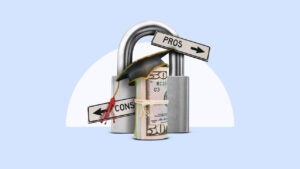Can you get a student loan with bad credit?




Key takeaways
- Federal student loans are the best option if you have bad credit since most don’t require a credit check.
- PLUS Loans and private student loans do require credit reviews, but you may still qualify with a cosigner or appeal.
- Under Trump’s One Big Beautiful Bill (OBBB), Grad PLUS Loans will be eliminated starting in July 2026, and Parent PLUS Loans will be capped.
- If you can’t qualify for federal or private student loans, consider income-share agreements (ISAs), which are based on future earnings instead of credit history.
Bad credit doesn’t automatically disqualify you from getting a student loan. Most federal loans don’t require a credit check, making them a great starting point for borrowers with low or limited credit history. For loans that do consider credit – like Parent PLUS or private loans – there are still workarounds, like applying with a cosigner.
Understanding what the best options are for student loans with bad credit can help you secure the financial aid you need without overextending your budget or taking on unnecessary risk.
Can you be denied student loans because of bad credit?
Yes – especially when applying for private student loans or federal PLUS loans, but most federal student loans do not involve a credit check, making them accessible to borrowers with bad or limited credit history.
You’re more likely to be denied a student loan in the following situations:
- You’re applying for a parent or grad PLUS Loan and have recent bankruptcies.
- You don’t meet the credit or income requirements.
That said, being denied doesn’t mean you’re out of options – it just means you may need to approach borrowing more strategically and explore alternatives.
Student loan options if you have bad credit
Borrowers with poor or limited credit history still have a variety of borrowing options, especially through the federal government. Here’s what’s available and how each works.
1. Federal student loan (no credit check required)
Federal student loans are the safest and most accessible loans for students with bad credit. The government offers:
- Direct subsidized loans (for students with financial need)
- Direct unsubsidized loans (available to most students regardless of need)
- Direct consolidation loans (to combine federal loans post-graduation)
These loans come with fixed interest rates, deferment options, income-driven repayment plans and forgiveness programs – all of which can significantly reduce the financial burden over time.

What to know about your evolving federal student loan repayment options
Confused or wondering what your federal loan repayment options are with the passage of Trump's reconciliation bill? Principal loans writer Andrew Pentis breaks it down for you.
Learn more about repayment options2. PLUS loans (credit check required)
The grad PLUS and parent PLUS loans are available to graduate students and parents of undergrads, respectively. These loans involve a credit check, but they don’t require a minimum credit score – only an absence of adverse credit history, such as the following:
- Recent bankruptcies
- Defaulted loans
- Foreclosures
- Accounts in collections for more than 90 days
If your credit is denied, you can still appeal or apply with an endorser (similar to a cosigner).
Changes to PLUS loans
The Trump administration’s One Big Beautiful Bill (OBBB) is reshaping how PLUS loans work and will limit how much students and parents can borrow. Under the bill, the following changes have been made:
- Parent PLUS loans would be capped at $50,000.
- Grad PLUS loans would be eliminated.
- Graduate students could borrow up to $100,000.
- Professional students (such as law or medical students) could borrow up to $150,000.
- The lifetime borrowing cap for all students would be set at $200,000.
Keep in mind: The changes passed in the OBBB is scheduled to roll out July 1, 2026. This mostly affects new students going into the 2026-2027 school year.
3. Private student loans
Private student loans are issued by banks, credit unions and online lenders – and they tend to be less forgiving. Good to excellent credit is often required, and applicants with bad credit are usually encouraged to apply with a cosigner.
Keep in mind: Private lenders offer both fixed and variable rates. Fixed rates stay the same throughout repayment, while variable rates can rise over time – a risk if you need longer to repay.
If you’re applying with bad credit:
- A cosigner can help: This is usually a parent or trusted adult with strong credit who agrees to repay the loan if you can’t.
- You might qualify for smaller amounts: Some lenders are willing to approve small loans, even if they decline larger ones.
- Loyalty can help: You may have a better shot if you apply through a lender you already have a relationship with (such as your bank).
- Compare lenders carefully: Look for flexible hardship policies, low or no fees and strong customer service.

Best student loans without a cosigner
Looking for a student loan without a cosigner? Check out Bankrate's list of the best lenders and their rates.
Check rates and lenders now4. Home equity loans (for parents)
Some parents with bad credit consider tapping their home equity to fund their child’s education. A home equity loan provides a lump sum and often comes with lower interest rates than private student loans – but it also puts your home at risk.
Though home equity loans have predictable and “super low” payments, along with long repayment terms that span from 15- to 30-years at single-digit interest rates, Bankrate senior writer and former loan officer Denny Ceizyk doesn’t recommend using it to fund a college education.
It's easy to forget that home equity – like any market-driven asset value – is a moving target. If owning a home is considered an essential foundation of building wealth, then that foundation should be protected at all costs.— Denny Ceizyk, Bankrate senior writer, Loans
Bankrate’s take: This option is only advisable if you have substantial equity, very stable finances and have already exhausted safer borrowing paths.
Tips to improve your credit before applying for a student loan
Because your credit plays a key role in the approval process, it’s wise to raise your credit score for student loan applications. Better credit may improve your approval odds and help you secure better student loan rates and terms when you borrow money.
Here are four ways you can improve your credit:
- Check your three credit reports: As you review your credit reports, list any inaccurate information and any negative items you need to address. You can claim a free copy of your three credit reports weekly at AnnualCreditReport.com.
- Dispute credit errors: In a recent study, 44 percent of consumers who checked their credit reports found at least one mistake. Some credit reporting mistakes damage your credit score. If you discover errors on your credit report, it’s wise to dispute them immediately.
- Lower your credit card utilization: A high balance-to-limit ratio on your credit cards can be bad for your credit score, even if you make your payments on time. You can lower your credit utilization rate (and save money in interest) by paying down your credit card balances. A credit limit increase is another out-of-the-box way to help you lower your credit utilization if you can’t afford to pay off all of your balances at once.
- Establish positive credit: Adding new positive accounts might benefit you over time if your credit file is thin. You may want to start with accounts you’re likely to qualify for despite having bad or no credit. Secured credit cards or credit builder loans may be worth considering here.
What to do if you can’t qualify for a student loan
If federal loans aren’t enough and you can’t qualify for private loans, there are still other strategies to fund your education.
1. Explore income-share agreements (ISAs)
An income-share agreement (ISA) lets you borrow tuition money in exchange for a percentage of your future income once you’re employed. No credit check is required.
Most ISAs include:
- A salary floor (repayment begins only if you earn above a certain amount)
- A payment cap (there’s a maximum you’ll pay back, regardless of earnings)
ISAs can work well for students pursuing higher-earning careers – but terms vary widely, so read the fine print carefully.
2. Look for other funding
- Grants and scholarships: Apply through your school and use scholarship databases
- Work-study: Many schools offer part-time jobs on or near campus
- Employer assistance: Some companies offer tuition help if you work while studying
3. Cut costs strategically
- Start at a community college and transfer later to save thousands
- Live at home or off-campus to cut housing costs
- Ask about tuition payment plans, which let you split your bill into more manageable chunks
Bottom line
It’s entirely possible to get a student loan with bad credit. Your best bet is to start with federal student loans, but if you need private student loans to help finance your education, bad credit could make borrowing money more difficult and expensive.
Take steps to improve your credit as much as possible before applying for financing, such as lowering your credit utilization ratio and disputing errors on your credit report. If you decide to accept an interest rate that you’re not thrilled about now, you can always refinance your student loans in the future.
Frequently asked questions
Why we ask for feedback Your feedback helps us improve our content and services. It takes less than a minute to complete.
Your responses are anonymous and will only be used for improving our website.
You may also like

Low-income loans: Personal loans for a tight budget

Should college students consider personal loans?

Pros and cons of private student loans

